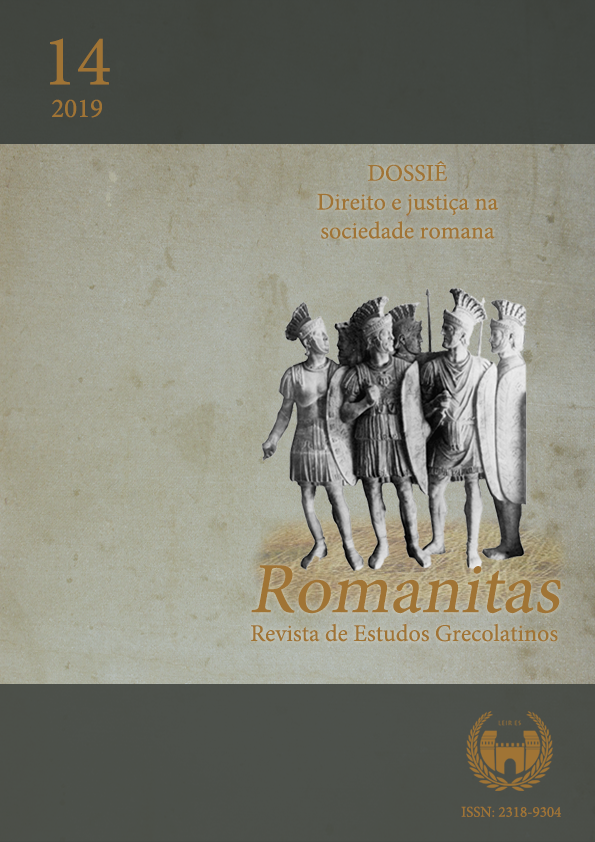O 'Código Justiniano' e as estratégias do poder imperial
DOI:
https://doi.org/10.17648/rom.v0i14.28896Palabras clave:
Corpus Iuris Civilis, Direito Romano, JustinianoResumen
Justiniano assumiu o poder em 527 e governou o Império Romano do Oriente até 565. Suas ações militares são conhecidas principalmente por meio da atuação dos generais Belisário e Narses no norte da África e na Península Itálica. O imperador também empreendeu um laborioso projeto jurídico, publicando um conjunto de livros – Codex, Digesto, Institutiones e Novellae – denominado posteriormente Corpus Iuris Civilis, por meio do qual muitos especialistas investigam o Direito Romano. O objetivo deste artigo é discutir a produção legal do imperador como mecanismo de poder e estratégia política de governo.
Descargas
Referencias
Documentação textual
AGAPETO. Advice to the emperor Justinian. In. BELL, P. N. Three poltitical voices from the Age of Justinian. Liverpool: University Press, 2009, p. 99-122.
ALIGHIERI, D. A divina comédia. São Paulo: Editora 34, 1998.
CORIPO. Juánide. Panegírico de Justino II. Introducciones, traducción y notas de Ana Ramírez Tirado. Madrid: Gredos, 1997.
JOHN MALALAS. Chronicle. Translated by Elizabeth Jeffreys, Michael Jeffreys and Roger Scott. Melbourne: Australian Association for Byzantine Studies, 1986.
JUSTINIAN. Institutiones. Translated by Peter Birks and Grant McLeod. New York: Cornell University, 1987.
JUSTINIAN. Corpus Juris Civilis. Translated by S. P. Scott. Cincinnati: Central Trust Company, 1932.
PAULO THE SILENTIARY. Description of the Church of Hagia Sophia. In. BELL, P. N. Three political voices from the Age of Justinian. Liverpool: Liverpool University Press, 2009, p. 189-212.
PROCOPIUS. History of the war. Translated by H. B. Dewing. Cambridge: Harvard University Press, 2006.
PROCOPIUS. Buildings. Translated by H. B. Dewing. Cambridge: Harvard University Press, 1996.
PROCOPIUS. Secret History. Translated by H. B. Dewing. Cambridge: Harvard University Press, 1935.
Obras de apoio
ARENDT, H. O que é política. Rio de Janeiro: Bertrand Brasil, 1999.
BIRKS, P.; MCLEOD, G. Introduction. In: JUSTINIAN. Justinian´s Institutes. New York: Cornell University Press, 1987.
BURNS, J. H. The Cambridge history of medieval political thought (350-1450). Cambridge: Cambridge University Press, 1988.
CORCORAN, S. The nouus codex and the codex repetitae praelectionis: Justinian and his codes. In. BENOIST, S.; DAGUET-GAGEY, A.; CAUWENBERGHE, C. H.-van (Ed.). Figures d´Empire, fragments de mémoire: pouvoirs et identités dans le monde romain imperial, IIe s. av. n. è. – VIe s. de n. è. Villeneuve d´Ascq: Presses Universitaires du Septentrion, 2011, p. 425-444.
EVANS, J. A. The emperor Justinian and the Byzantine Empire. London: Greenwood Press, 2005.
GIBBON, E. The history of the decline and fall of the Roman Empire. London: Joseph Ogle Robinson, 1830.
HARRIES, J. Law and Empire in Late Antiquity. Cambridge: Cambridge University Press, 2004.
HUMFRESS, C. Law and legal practice in the age of Justinian. In. MAAS, M. (Ed.). The Cambridge Companion to the Age of Justinian. Cambridge: Cambridge University Press, 2005, p. 161-184.
KALDELLIS, A. Procopius of Caesarea: tyranny, history and philosophy at the end of Antiquity. Philadelphia: University of Pennsylvania Press, 2004.
KUTTNER, S. The revival of jurisprudence. In. BENSON, R.L.; CONSTABLE, G. (Ed.). Renaissance and Renewal in the Twelfth Century. Cambridge: Harvard University Press, 1982, p. 299-323.
LIEBS, D. Roman law. In. CAMERON, A.; WARD-PERKINS, B.; WHITBY, M. (Ed.). The Cambridge Ancient History: Late Antiquity, empire and successors, A.D. 425-600. Cambridge: Cambridge University Press, 2008, p. 238-259.
MAAS, M. John Lydus and the Roman past: antiquarianism and politics in the age of Justinian. London: Routledge, 1992.
METZER, E. (Ed.). A companion to Justinian´s Institutes. London: Duckworth, 1998.
MOUSOURAKIS, G. A legal History of Rome. London: Routledge, 2007.
NACATA JUNIOR, E. K. O programa de estudos de Justiniano para as escolas de Direito do Império Bizantino. Revista Faculdade de Direito da Univiversidade de São Paulo, v. 106/107, p. 677‑719, 2011/2012.
RADDING, C. M.; CIARALLI, A. The Corpus Iuris Civilis in the Middle Ages: manuscripts and transmission from the sixth century to the juristic revival. Leiden: Brill, 2007.
SCHELTEMA, H. J. L’enseignement de droit des antécesseurs. Leiden: Brill, 1970.
SCHIPANI, S.; ARAUJO, D. B. dos S. G. (Org.). Sistema jurídico romanístico e subsistema jurídico latino-americano. São Paulo: FGV, 2015.
STEIN, P. Roman Law in European History. New York: Cambridge University Press, 1999.
STEIN, P. The development of the institutional system. In: STEIN, P. G.; LEWIS, A. D. E. (Ed.). Studies in Justinian´s Institutes in memory of J. A. C. Thomas. London: Sweet & Maxwell, 1983, p. 151-163.
STOLTE, B. Justice: legal literature. In: JEFFREYS, E.; HALDON, J.F.; CORMACK, R. (Ed.). The Oxford Handbook of Byzantine Studies. Oxford: University Press, 2008, p. 691‑698.
TAKÁCS, S. A., The construction of authority in Ancient Rome and Byzantium: the rhetoric of Empire. Cambridge: Cambridge University Press, 2009.
VARGAS VALENCIA, A. Principios de derechos humanos en las Instituciones de Justiniano. In. CERQUEIRA, F. et al. Saberes e poderes no Mundo Antigo: estudos ibero-latinos-americanos. Coimbra: Imprensa da Universidade de Coimbra, 2013, p. 117- 128.
WEBER, M. Economia y sociedade. México: Fondo de cultura econômica, 1996.
Descargas
Publicado
Número
Sección
Licencia

Esta obra está bajo una licencia internacional Creative Commons Atribución-NoComercial-SinDerivadas 4.0.
a. Los autores conservan los derechos de autor y otorgan a la revista el derecho de publicar primero.
c. Los autores están autorizados a asumir contratos adicionales por separado, para la distribución no exclusiva de la versión del trabajo publicado en esta revista (por ejemplo, publicación en repositorio institucional o como capítulo de libro), con reconocimiento de autoría y publicación inicial en esta revista.
c. Se permite y se estimula a los autores a publicar y distribuir su trabajo online (por ejemplo, en repositorios institucionales o en su página personal) después de la primera publicación de la revista, con los debidos créditos. Atribución-No Comercial-No Derivadas
d. Los textos de la revista tienen licencia bajo CC BY 4.0 Deed Atribución 4.0 Internacional (CC BY).

























